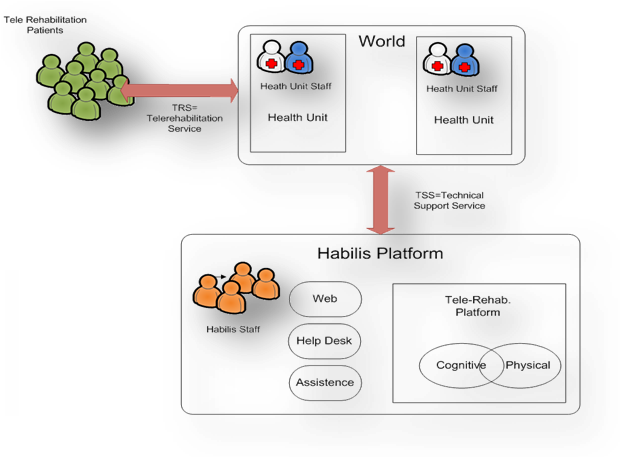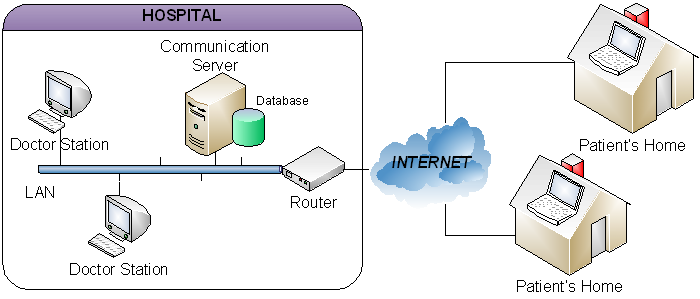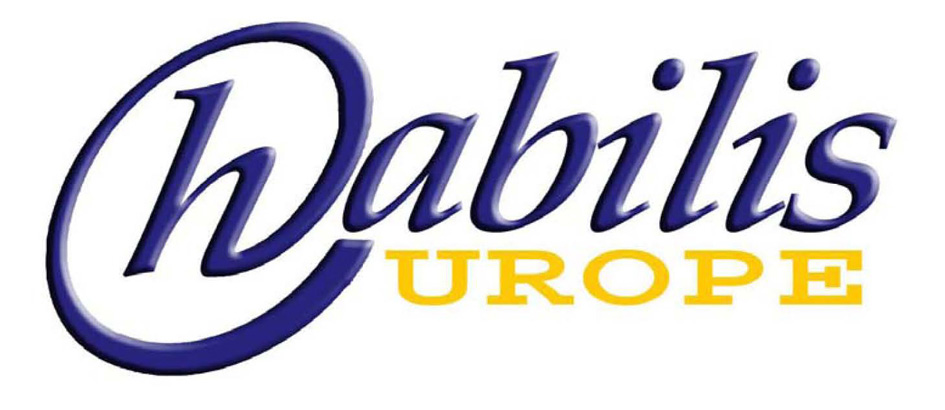Corporate area
The core concept for HABILIS is to provide European healthcare systems and stakeholders with an innovative pan European service, which can be delivered in a customized way in each
European country. During the “CLEAR” project this will be achieved with the establishment of a European company, HABILIS Europe.
The aims of Habilis Europe, in facts, is to standardize and coordinate the activities of a network of companies established at national level (Habilis Italy, Habilis Spain, etc.)
and at local level (Local Service Providers) in order to provide this European telerehabilitation service.
The Habilis network is already in place, involving the CLEAR partners, and is based on an open partnership.: interested parties have the possibility to join Habilis as an User or
a Service Provider already during the project execution.
Why you should use Habilis:
Key elements of rehabilitation are:
- improving the physical/cognitive functioning of the patients;
- teaching patients how to take responsibility for their own health status once being at home.
Overall rehabilitation treatments are effective, but long term maintenance is disappointing. One of the explanations for this is the fact that patients experience problems with the translation of the learned skills in the rehab setting to their every day environment.
Using the Habilis service, the rehabilitation treatments, or part of these treatments. will be provided in the daily environment of the patients. Treatments will be supervised by a professional team and this will increases the effectiveness of the rehabilitation. The Habilis service offers web-based exercise rehabilitation protocols for the home environment for patients with different diagnosis like COPD, chronic pain, osteoarthritis and neurological diseases including cognitive problems.
How to use Habilis
You can use the platform to set up a tele-rehabilitation service for your patients.

These exercise set and proactive self care, tailored to the home environment, allow people to maintain their abilities for a longer period of time.
The service is focused on the “HABILIS” tele-rehabilitation software platform that integrates advanced information management and synchronous and asynchronous communication facilities.
Patients perform the therapies at home, execute the specific exercises that are recorded, encrypted and sent to the professionals doctors’ team. The patients assessment software allows doctors to assess the exercises and update the therapy remotely.
See Platform Description for further information on the Habilis Platform Go to Clinical Protocols to see how the service has been already organized within the Clinic Centers during the CLEAR project Go to Implemented Services to see where the service is already present Go to Service Implementation to see which steps are needed to implement a tele-rehabilitation service.
Platform description
The Tele-Rehabilitation Service is based on the Habilis Platform. It is delivered through the following main equipment and software modules:
- Server, which allows the management of the service and is installed at the Clinical Centre premises.
- Service Administrator Module (HSA) for the Administration of the Service, allows the execution of the administration tasks in relation to its clinical use. The HSA has the task to: manage users, distribute and save the password, assign the license to each user to access the service.
- Patient Station (PS) permits patients to receive the clinical protocols or therapies, or exercises assigned by the clinical team. It allows patients to see the videos containing the instructions at different speed as many times as necessary. It permits to record videos during the execution of the exercises and to transmit automatically them to the Doctor who can evaluate them offline afterwards.
- Doctor Station (DS) that allows the clinicians to define a set of rehab exercises, record audio/video exercises, so that they can be proposed to the patient who has to make the rehab at home or in public places (kiosks, rehabilitative centres); assign his/her patients a set of exercises, suggesting the correct applications execution; control the quality of the execution remotely by playing the videos recorded by patients. Through the Doctor Station, clinicians can also directly communicate with the patients by the Videoconference Module to verify their recovery.

Platform description
Do you want to know more about the pilot studies? Please, click here.
Realized Services
The following Clinical Centres have already started the service implementation:
| Acronym | Partner name | Country | Website | Status |
|---|---|---|---|---|
| RCR | Rehabilitation Centre Het Roessingh | NL | www.rrd.nl | preparation |
| MUW | The Medical University of Warsaw | PL | www.wum.edu.pl | preparation |
| FPING | Fundació Privada Institut de Neur. Guttmann | ES | www.guttmann.com | preparation |
| AUSL 11 | Azienda Unità Sanitaria Locale 11 | IT | www.uslcentro.toscana.it | implemented |
Services Implementation
To Join the Habilis network you should:
- Plan the modality of the service (at home or in kiosks);
- Define the number of patients that need to be treated contemporarily and the number of doctor that will use the platform at the same time;
- Acquire the Technical Support Service from Habilis. This includes the HW/SW platform and all support services;
- Define its own clinical protocols or use the already defined clinical protocols;
- Define the rehabilitation exercises by means of the telerehabilitation platform (or use an already existing Telerehabilitation library);
- Start using the platform by assigning the rehabilitation sessions to the patients and to assess their progresses.
Corporation Strategy: Why you should join Habilis
The HABILIS technical platform has huge potential to support the development of a wide range of protocols to be used for rehabilitation, for monitoring of patient status
and to guide him/her to carry out the necessary exercises foreseen by the therapy, including exercises that entail a certain degree of interactivity with the platform in
the case of cognitive problems.
Being highly adaptable to the development of home protocols relevant to different types of pathologies, the proposed system has a substantial potential for wide take-up
by healthcare centres.
Corporate networking is the approach identified by HABILIS to prepare the deployment in Europe, with the Habilis Europe trademark.

- Habilis Europe to coordinate the business;
- Habilis Country name to facilitate sales at national level;
- Lo.S.P. local service providers supporting the technical operation of the business;
- Lo.S.P. are the day to day interface with the hospital.
The European perspective: why you should endorse Habilis
From a socio-economic perspective the project has substantial potential to step up the quality of rehabilitation practice in Europe, by pushing for common standards in
telerehabilitation and making it possible to design rehabilitation paths that can be implemented mainly in a remote way.
As pointed out in the Journal of Rehabilitation Medicine (http://www.medicaljournals.se/jrm/news.php), which has issued in January 2007 a White Book on Physical and
Rehabilitation in Europe, uniformly high standards of care in rehabilitation are needed, that can be combined with the usage of new technologies likely to contribute
significantly to independent living and quality of life of people with disabilities in Europe.
The CLEAR project can contribute substantially at least from three different angles:
- It is conceived as a platform to deliver services that will benefit the European patients in general and more in particular the older people (and their families). The choice of the pathologies on which the pilot tests will run is functional to measure the ability of the platform and of its services to meet specific requirements in terms of usability and adaptation to the specific needs of patients suffering from given diseases. This customisation to the needs of the elderly should result in a precious set of knowledge and experience to deploy, after the testing phase, services and products likely to increase the degree of independence of older people and thus their quality of life;
-
Increased effectiveness of care systems and sustainable chronic disease management systems. The CLEAR project, and later the HABILIS network, are expected to bear an
important impact on the sustainability of e-health services in the full respect of the existing Community and national legislative framework, thus improving the efficiency
and effectiveness of healthcare centres. It is expected that the Habilis services could start from a minimum of 5 euros/day for the long term treatment.
The benefit is potentially enormous taking into account the time projections of therapies or treatments extension, like in the case of chronic diseases, in the long run. The experience will bring precious elements to better understand the socio-economic impact of the e-Health services proposed and to better adapt them in the future to the needs and economic viability of healthcare systems, as well as to the needs of the patients; -
Increased market potential for European industry, in particular SMEs. Oriented to the idea of a pan-European service based on common standards, HABILIS calls for the direct
involvement of different types of stakeholders having a relevant role in the healthcare value chain. The structure of the service itself attributes an important role to the
so-called Local Service Providers (Lo.S.P.), local companies (mostly SMEs) that will have the mission of assisting the local hospitals or healthcare centres from a technical
point of view. As well as foreseeing such a role already in the implementation of the pilot phase, HABILIS creates opportunity for the industry and more specifically for the
SMEs of the ICT sector in areas like:
- Technical Assistance to Healthcare centres or systems;
- Localisation of services;
- Development of applications related to specific needs of a given system or centre (eg. related to reimbursement schemes or policies);
- Integration of monitoring or assistive devices as necessary.